人教版(2019)必修第三册Unit 1 Festivals and celebrations reading 课件(共20张ppt)
文档属性
| 名称 | 人教版(2019)必修第三册Unit 1 Festivals and celebrations reading 课件(共20张ppt) |
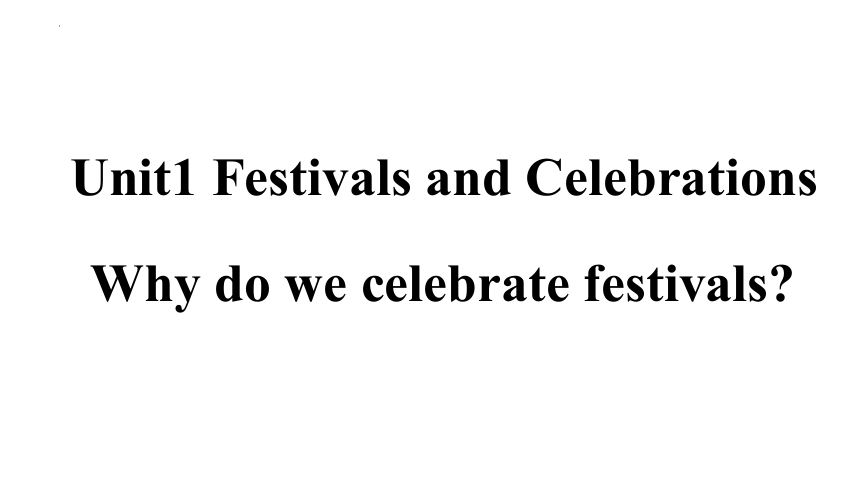
|
|
| 格式 | pptx | ||
| 文件大小 | 3.6MB | ||
| 资源类型 | 教案 | ||
| 版本资源 | 人教版(2019) | ||
| 科目 | 英语 | ||
| 更新时间 | 2023-08-18 00:00:00 | ||
图片预览

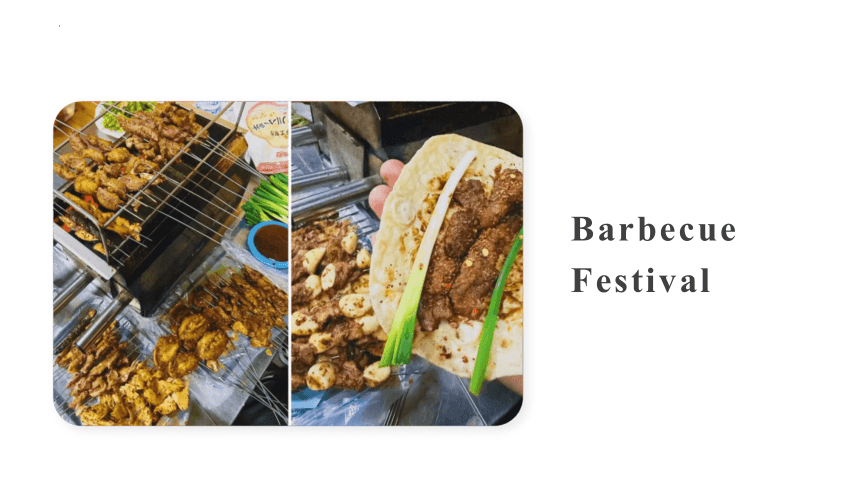
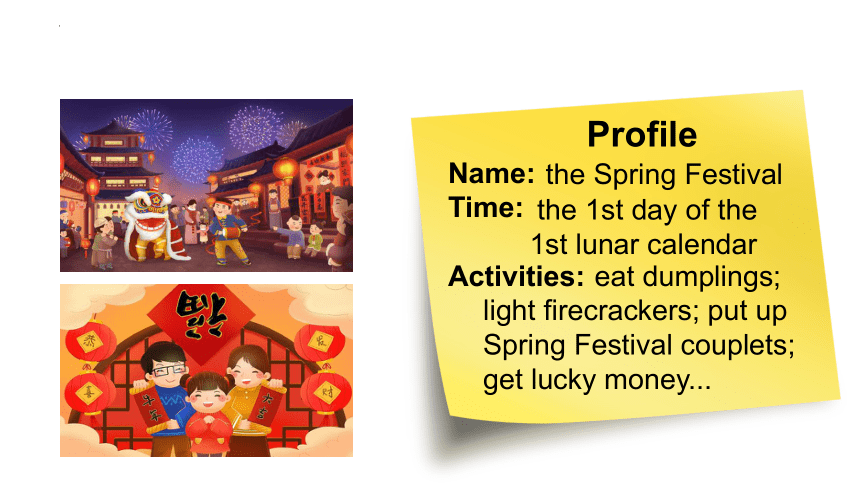
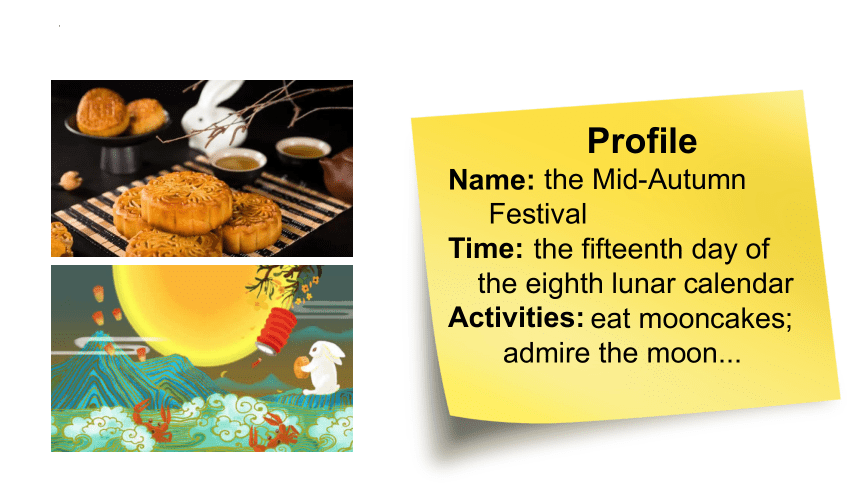
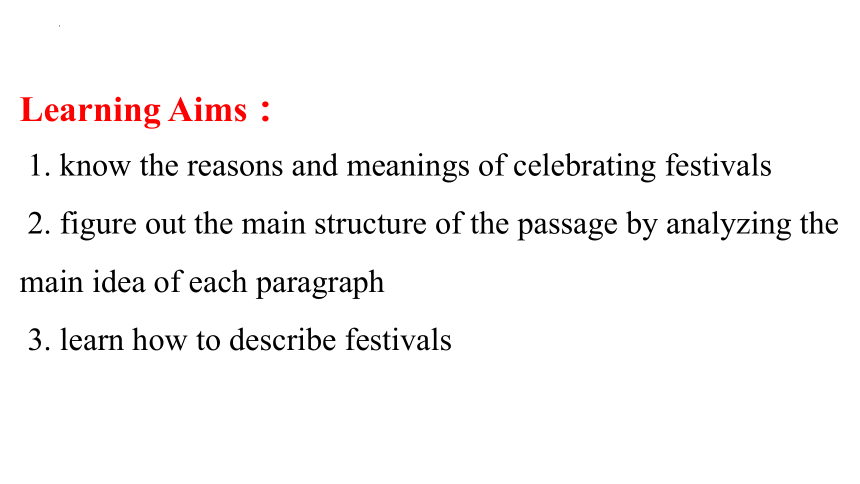

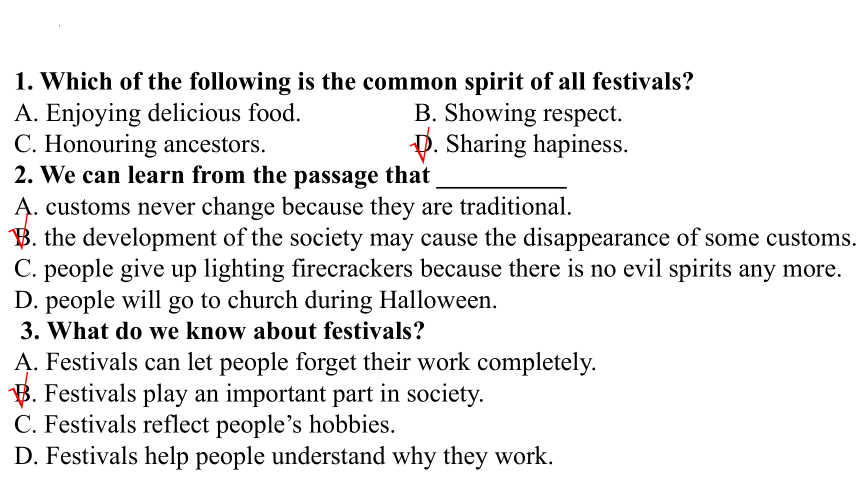
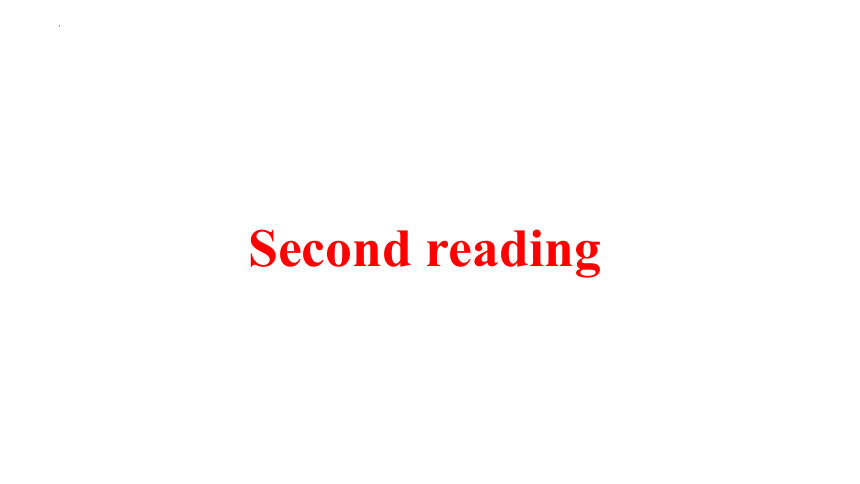
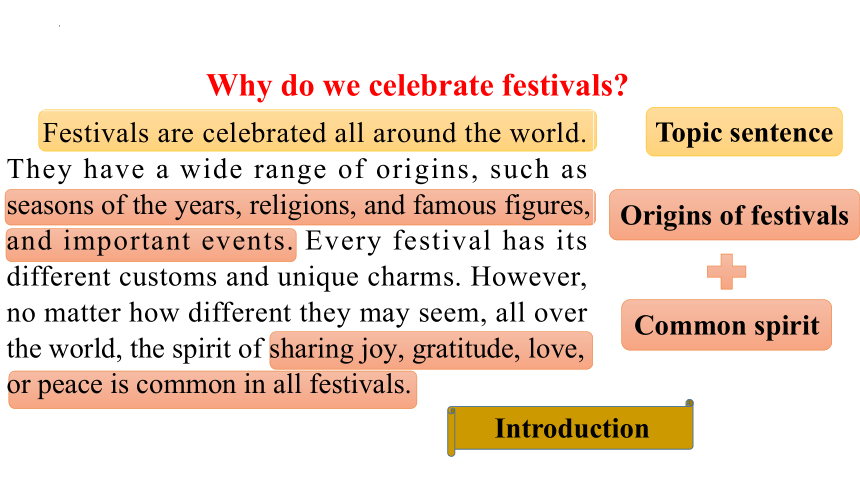
文档简介
(共20张PPT)
Why do we celebrate festivals
Unit1 Festivals and Celebrations
Barbecue Festival
Profile
Name:
Time:
Activities:
the Spring Festival
the 1st day of the 1st lunar calendar
eat dumplings; light firecrackers; put up Spring Festival couplets; get lucky money...
Profile
Name:
Time:
Activities:
the Mid-Autumn Festival
the fifteenth day of the eighth lunar calendar
eat mooncakes; admire the moon...
Learning Aims:
1. know the reasons and meanings of celebrating festivals
2. figure out the main structure of the passage by analyzing the main idea of each paragraph
3. learn how to describe festivals
First reading
1. Which of the following is the common spirit of all festivals
A. Enjoying delicious food. B. Showing respect.
C. Honouring ancestors. D. Sharing hapiness.
2. We can learn from the passage that __________
A. customs never change because they are traditional.
B. the development of the society may cause the disappearance of some customs.
C. people give up lighting firecrackers because there is no evil spirits any more.
D. people will go to church during Halloween.
3. What do we know about festivals
A. Festivals can let people forget their work completely.
B. Festivals play an important part in society.
C. Festivals reflect people’s hobbies.
D. Festivals help people understand why they work.
√
√
√
Second reading
Festivals are celebrated all around the world. They have a wide range of origins, such as seasons of the years, religions, and famous figures, and important events. Every festival has its different customs and unique charms. However, no matter how different they may seem, all over the world, the spirit of sharing joy, gratitude, love, or peace is common in all festivals.
Why do we celebrate festivals
Topic sentence
Origins of festivals
Common spirit
Introduction
Of all the traditional festivals, the harvest festival can be found in almost every culture. This important agricultural festival takes place after all the crops have been gathered in. People celebrate to show that they are grateful for the year’s supply of food. In ancient Egypt, the harvest festival was celebrated during the springtime--- the Egyptian harvest season. It featured a parade and a great feast with music, dancing, and sports. Today, in some European countries, people decorate churches and town halls with flowers and fruit, and get together to celebrate over a meal. During the Mid-Autumn Festival in China, families gather to admire the shining moon and enjoy delicious mooncakes.
Topic sentence
When
Why
Eaxmple 1
Eaxmple 2
Eaxmple 3
The harvest festival
Customs play a significant role in festivals, but sometimes, they can change over time. With the development of modern society and the spread of new ideas, some traditions may fade away and others may be established. One example is the typical Chinese Spring Festival custom of lighting firecrackers to drive away the evil spirits and celebrate the new year. Nowadays, many big cities have given up this custom in order to avoid air pollution. Another example is Halloween, which slowly became an exciting festival for children, in spite of its religious origins.
Changes in customs
Why does the author mention “Spring Festival” and “Halloween”
A. To make a comparison.
B. To support the topic sentence.
C. To make a prediction.
√
Festivals are becoming more and more commercial, with businesses taking advantage of the celebrations. Online shopping websites and social media apps have made it much easier for the public to spend more on gifts for their loved ones. Although some believe festivals should not be commercialized, others believe the increase in spending is good for the economy and public happiness.
Topic sentence
Different attitudes
What’s the author’s attitude towards the commercialised festivals
A. Supportive. B. Neutural. C. Opposed. D. Unconcerned.
√
Commercialized festival
Festivals are an important part of society. They reflect people’s wishes, beliefs, faiths, and attitudes towards life. They are occasions that allow us to relax and enjoy life, and forget about our work for a little while. They help us understand where we came from, who we are, and what to appreciate. And if you study festivals carefully, you may be surprised to find that different cultures actually have a lot in common after all.
Topic sentence
Significance 1
Significance 2
Significance 3
Conclusion
Where is the text probably taken from
A. A tour brochure.
B. A cultural magazine.
C. A story book.
D. A news report.
√
Post-reading:
think about how to describe festivals
1. Every festival has its different customs and unique charms. However, no matter how different they may seem, all over the world, the spirit of sharing joy, gratitude, love, or peace is common in all festivals.(Para.1)
2. People celebrate to show that...(Para.2)
3. With the development of modern society and the spread of new ideas, some traditions may fade away and others may be established.(Para.3)
4. Festivals are becoming more and more commercial, with businesses taking advantage of the celebrations.(Para.4)
5. the whole fifth paragraph
1. 介绍时间:
_________, an important festival for Chinese people, falls on the ... day of the ... lunar calendar. (is celebrated on)
2. 介绍活动:
When it comes to how we celebrate ________, we often have a wide range of choices, such as......
(enjoying delicious food, eating dumplings/mooncakes/zongzi, visiting relatives or friends)
3. 介绍意义:
As one of the traditional Chinese festivals, it has been enjoying great popularity in our country.
Not only should we spend some time with our family during festivals but we also need to keep our cultural traditions in mind.
Try to use what we have learnt to describe different festivals.
1. The Spring Festival:
__________________________________________________________________________________________________________________
2. The Mid-Autumn Festival:
__________________________________________________________________________________________________________________
Thanks for your careful listening!
Why do we celebrate festivals
Unit1 Festivals and Celebrations
Barbecue Festival
Profile
Name:
Time:
Activities:
the Spring Festival
the 1st day of the 1st lunar calendar
eat dumplings; light firecrackers; put up Spring Festival couplets; get lucky money...
Profile
Name:
Time:
Activities:
the Mid-Autumn Festival
the fifteenth day of the eighth lunar calendar
eat mooncakes; admire the moon...
Learning Aims:
1. know the reasons and meanings of celebrating festivals
2. figure out the main structure of the passage by analyzing the main idea of each paragraph
3. learn how to describe festivals
First reading
1. Which of the following is the common spirit of all festivals
A. Enjoying delicious food. B. Showing respect.
C. Honouring ancestors. D. Sharing hapiness.
2. We can learn from the passage that __________
A. customs never change because they are traditional.
B. the development of the society may cause the disappearance of some customs.
C. people give up lighting firecrackers because there is no evil spirits any more.
D. people will go to church during Halloween.
3. What do we know about festivals
A. Festivals can let people forget their work completely.
B. Festivals play an important part in society.
C. Festivals reflect people’s hobbies.
D. Festivals help people understand why they work.
√
√
√
Second reading
Festivals are celebrated all around the world. They have a wide range of origins, such as seasons of the years, religions, and famous figures, and important events. Every festival has its different customs and unique charms. However, no matter how different they may seem, all over the world, the spirit of sharing joy, gratitude, love, or peace is common in all festivals.
Why do we celebrate festivals
Topic sentence
Origins of festivals
Common spirit
Introduction
Of all the traditional festivals, the harvest festival can be found in almost every culture. This important agricultural festival takes place after all the crops have been gathered in. People celebrate to show that they are grateful for the year’s supply of food. In ancient Egypt, the harvest festival was celebrated during the springtime--- the Egyptian harvest season. It featured a parade and a great feast with music, dancing, and sports. Today, in some European countries, people decorate churches and town halls with flowers and fruit, and get together to celebrate over a meal. During the Mid-Autumn Festival in China, families gather to admire the shining moon and enjoy delicious mooncakes.
Topic sentence
When
Why
Eaxmple 1
Eaxmple 2
Eaxmple 3
The harvest festival
Customs play a significant role in festivals, but sometimes, they can change over time. With the development of modern society and the spread of new ideas, some traditions may fade away and others may be established. One example is the typical Chinese Spring Festival custom of lighting firecrackers to drive away the evil spirits and celebrate the new year. Nowadays, many big cities have given up this custom in order to avoid air pollution. Another example is Halloween, which slowly became an exciting festival for children, in spite of its religious origins.
Changes in customs
Why does the author mention “Spring Festival” and “Halloween”
A. To make a comparison.
B. To support the topic sentence.
C. To make a prediction.
√
Festivals are becoming more and more commercial, with businesses taking advantage of the celebrations. Online shopping websites and social media apps have made it much easier for the public to spend more on gifts for their loved ones. Although some believe festivals should not be commercialized, others believe the increase in spending is good for the economy and public happiness.
Topic sentence
Different attitudes
What’s the author’s attitude towards the commercialised festivals
A. Supportive. B. Neutural. C. Opposed. D. Unconcerned.
√
Commercialized festival
Festivals are an important part of society. They reflect people’s wishes, beliefs, faiths, and attitudes towards life. They are occasions that allow us to relax and enjoy life, and forget about our work for a little while. They help us understand where we came from, who we are, and what to appreciate. And if you study festivals carefully, you may be surprised to find that different cultures actually have a lot in common after all.
Topic sentence
Significance 1
Significance 2
Significance 3
Conclusion
Where is the text probably taken from
A. A tour brochure.
B. A cultural magazine.
C. A story book.
D. A news report.
√
Post-reading:
think about how to describe festivals
1. Every festival has its different customs and unique charms. However, no matter how different they may seem, all over the world, the spirit of sharing joy, gratitude, love, or peace is common in all festivals.(Para.1)
2. People celebrate to show that...(Para.2)
3. With the development of modern society and the spread of new ideas, some traditions may fade away and others may be established.(Para.3)
4. Festivals are becoming more and more commercial, with businesses taking advantage of the celebrations.(Para.4)
5. the whole fifth paragraph
1. 介绍时间:
_________, an important festival for Chinese people, falls on the ... day of the ... lunar calendar. (is celebrated on)
2. 介绍活动:
When it comes to how we celebrate ________, we often have a wide range of choices, such as......
(enjoying delicious food, eating dumplings/mooncakes/zongzi, visiting relatives or friends)
3. 介绍意义:
As one of the traditional Chinese festivals, it has been enjoying great popularity in our country.
Not only should we spend some time with our family during festivals but we also need to keep our cultural traditions in mind.
Try to use what we have learnt to describe different festivals.
1. The Spring Festival:
__________________________________________________________________________________________________________________
2. The Mid-Autumn Festival:
__________________________________________________________________________________________________________________
Thanks for your careful listening!
